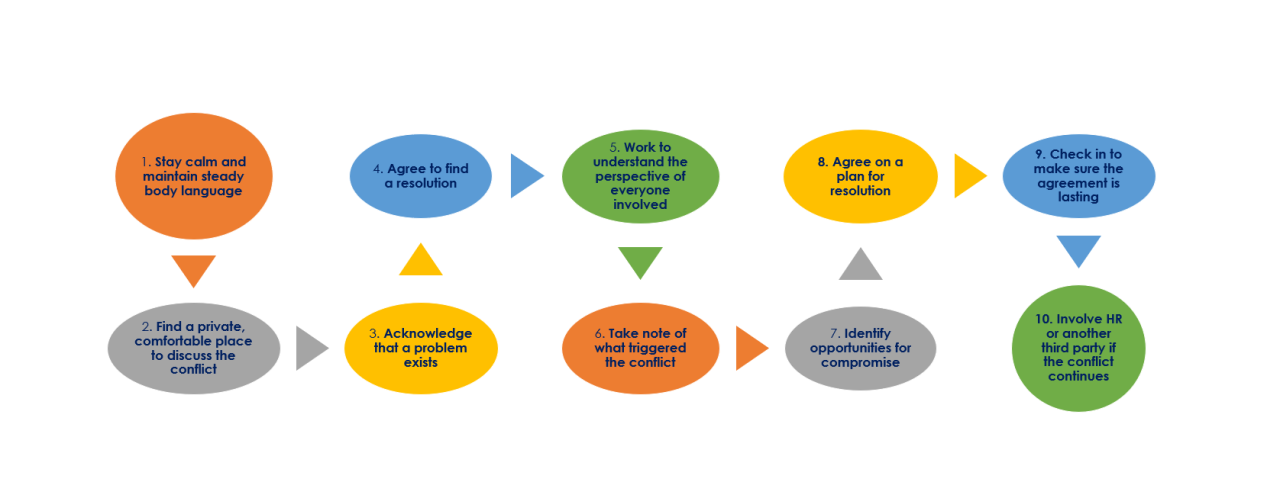
Conflict Management Tips Navigating Workplace Disputes
Navigating Conflict in the Workplace: Essential Tips for Success
Understanding the Nature of Workplace Conflict
Conflict is an inevitable part of any workplace, stemming from differences in personalities, priorities, and perspectives. Understanding the nature of workplace conflict is the first step in effectively managing and resolving disputes. By recognizing its root causes and underlying dynamics, managers can develop strategies to address conflict constructively.
Encouraging Open Communication
Open communication is essential for resolving workplace conflict. Encourage employees to express their concerns, opinions, and perspectives openly and respectfully. Create opportunities for dialogue and discussion, whether through team meetings, one-on-one conversations, or anonymous suggestion boxes. By fostering a culture of open communication, managers can address conflicts before they escalate and promote a sense of transparency and trust within the team.
Setting Clear Expectations and Boundaries
Setting clear expectations and boundaries is crucial for preventing and managing workplace conflict. Clearly define roles, responsibilities, and performance expectations for each team member. Establish guidelines for acceptable behavior and communication, and ensure that everyone understands the consequences of violating these boundaries. By setting clear expectations, managers can reduce misunderstandings and conflicts arising from ambiguity or uncertainty.
Active Listening and Empathy
Active listening and empathy are powerful tools for resolving workplace conflict. Take the time to listen to all parties involved, seeking to understand their perspectives and concerns. Show empathy and compassion, acknowledging the emotions and experiences underlying their grievances. By demonstrating empathy, managers can build rapport and trust with employees, paving the way for more effective conflict resolution.
Seeking Common Ground
In many cases, workplace conflict arises from miscommunication or differing priorities rather than irreconcilable differences. Encourage employees to identify common ground and shared goals, focusing on areas of agreement rather than contention. By highlighting shared interests and objectives, managers can foster collaboration and cooperation, reducing the likelihood of conflict and promoting a more harmonious work environment.
Developing Conflict Resolution Skills
Effective conflict resolution is a skill that can be developed and refined over time. Provide training and resources to help employees develop conflict resolution skills, such as active listening, negotiation, and problem-solving. Offer workshops, seminars, or online courses on conflict management techniques and strategies. By investing in employee development, managers can empower their teams to address conflicts more effectively and proactively.
Addressing Conflict Proactively
Proactive conflict management is key to preventing minor disputes from escalating into major conflicts. Encourage employees to address conflicts early on, rather than letting them fester and grow. Provide channels for employees to raise concerns or grievances in a safe and confidential manner, such as through HR or mediation services. By addressing conflicts proactively, managers can nip potential issues in the bud and maintain a positive and productive work environment.
Mediation and Facilitation
In some cases, conflicts may require the intervention of a neutral third party to facilitate resolution. Consider engaging a trained mediator or facilitator to help resolve complex or deeply entrenched conflicts. Mediators can help facilitate productive dialogue, identify common ground, and explore mutually acceptable solutions. By bringing in an impartial mediator, managers can promote fairness and objectivity in the conflict resolution process.
Promoting a Culture of Respect and Civility
Respect and civility are essential for maintaining a positive work environment and preventing conflicts from arising. Set a tone of respect and professionalism from the top down, modeling appropriate behavior and communication for employees to follow. Establish zero-tolerance policies for harassment, discrimination, or bullying, and take swift and decisive action against violations. By promoting a culture of respect and civility, managers can create a workplace where conflicts are less likely to occur and more easily resolved when they do.
Learning and Growing from Conflict
Conflict, when managed effectively, can be a catalyst for positive change and growth within an organization. Encourage employees to view conflicts as opportunities for learning and improvement, rather than obstacles to be avoided. Conduct post-mortem analyses of conflicts, identifying lessons learned and areas for improvement in communication, processes, or policies. By embracing conflict as a natural part of the workplace experience, managers can foster a culture of continuous learning and growth. Read more about tips for managing conflict in the workplace


